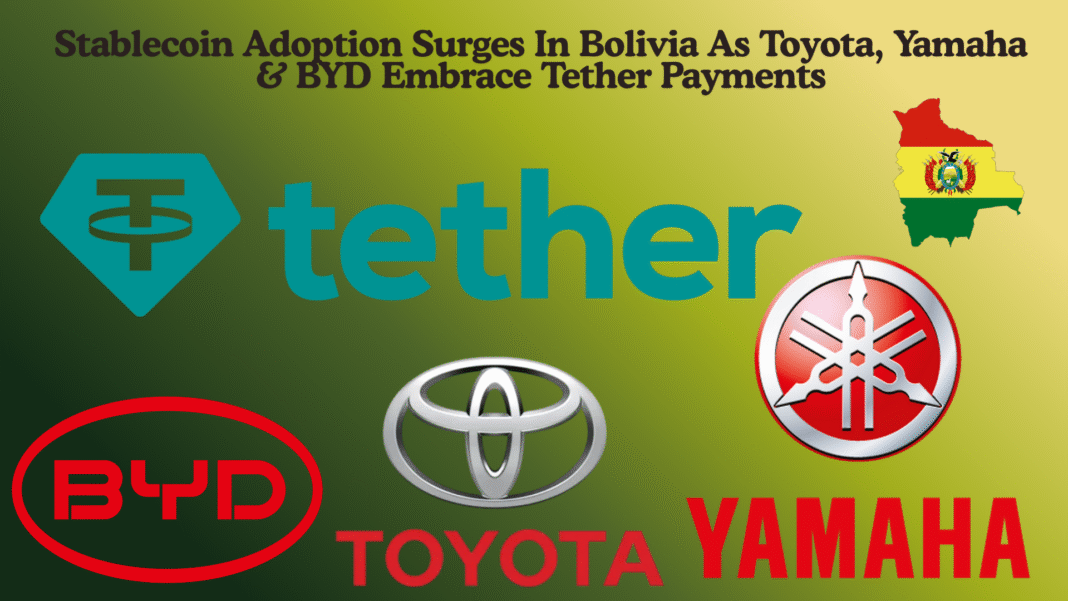Bolivia is experiencing a significant rise in cryptocurrency adoption as three major international automobile manufacturers, Toyota, Yamaha, and BYD, have started accepting Tether (USDT) as a form of payment.
This takes place as the country finds itself in an economic crisis, and with U.S. dollar reserves dwindling.
Tether CEO Paolo Ardoino announced the milestone on Sunday morning by sharing photos from Bolivian dealerships in La Paz showing signs declaring U.S. dollar tethering (USDT) to pay is “easy, fast, and safe.”
Crypto security firm BitGo also affirmed it has agreed to work with Tether and Bolivia Toyota as a partner to supervise self-custody processes and confirm secure execution, remarking that the first purchase of Toyota with USDT occurred on Saturday.
From Ban to Mainstream Adoption
For a long time, Bolivia was viewed as one of Latin America’s strongest opponents of cryptocurrency and imposed a strict ban until June 2024.
However, this position changed quickly as the government removed restrictions on banks using Bitcoin and stablecoins.
Following this policy change, crypto adoption took off rapidly, starting with the approval of the national oil and gas company Yacimientos Petrolíferos Fiscales Bolivianos to use crypto for fuel imports in March.
This development can be seen as a desperate attempt to deal with a worsening dollar shortage, as official foreign exchange reserves have declined 98% from $12.7 billion in 2014 to only $171 million in August 2025.
Stablecoins as a Lifeline in Trade and Retail
Stablecoins, such as Tether, have swiftly become a rescue for businesses and individuals in Bolivia. Retailers such as stores (in the airport and elsewhere) are already marking prices in USDT, automatically protecting themselves from boliviano instability.
Importers are also starting to utilize stablecoins to continue operations; they will buy USDT from local exchanges or offshore third-party accounts and then convert to dollars before paying overseas suppliers.
According to Gabriel Campa, TowerBank’s head of digital assets, Bolivia has developed a “stablecoin circular economy,” where imports, sales, and even consumer payments are increasingly conducted in digital assets.
Also Read: Tether Eyes Gold-Mining Investments, In Talks Over Refining, Trading And Royalties
Political Crossroads Ahead
The speedy process of crypto adoption comes at a politically sensitive moment for Bolivia, as the country prepares for polls on October 19th for a run-off election between Rodrigo Paz Pereira of the Christian Democratic Party and Jorge “Tuto” Quiroga of the Freedom and Democracy alliance.
Pereira has announced to fight corruption potentially through the use of blockchain technology to increase transparency, while Quiroga’s crypto policies are unclear.
The outcome will be important for the economic future of Bolivia, which is looking for alternatives after almost 20 years under the Movement for Socialism party, which has been heavily criticized for its management of financial resources and foreign reserves.
Also Read: Tether Invests In Chilean Exchange Orionx To Boost Cross-Border Payments
Tether Expands Global Influence
The recent acceptance by Bolivia of Tether is part of the stablecoin giant’s latest initiative to enhance its global expansion agenda.
On July 1st, Tether signed a memorandum of understanding with Zanzibar to develop digital asset education opportunities that will include gateways for stablecoins and education programs in blockchain and peer-to-peer technologies, UnoCrypto reported.
Most recently, on September 13th, we reported that Tether introduced USA₮, a U.S.-regulated stablecoin, with Bo Hines named as CEO. With support from Anchorage Digital and Cantor Fitzgerald, this product aims to meet important regulatory requirements while Tether leverages its extensive global reach, with nearly 500 million users and a market capitalization in excess of $169 billion.
These actions speak to a continued trajectory at Tether with regard to forming a focal point for the progression of a credible pathway to reshaping the financial system globally, with Bolivia demonstrating one of Tether’s more thrilling examples of real-world application.
Also Read: Tether Launches Native USD₮ On Kaia Blockchain In Partnership With LINE NEXT


